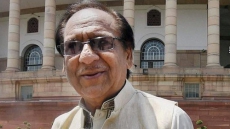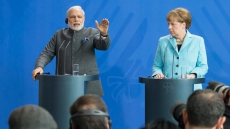DOHA: Vowing to root out corruption in India, Prime Minister Narendra Modi today said he has "faced problems" by depriving the "sweets of many" and saved over Rs 36,000 crore annually by stopping leakage and theft in government schemes.
Addressing the members of Indian community at the end of his two-day visit to Qatar, PM Modi said, "We have only cleaned up the surface (on corruption) and a detailed clean-up remains."
"We have stopped the sweets of many and in doing so, I have also faced problems. But I get the strength to face these problems from the love received from 125 crore Indians," he said, likening criticism of the government's action to a child getting angry on being deprived of a sweet by his mother.
Also talked about the investment opportunities in India and why the world must come and @makeinindia. pic.twitter.com/ZX0kuWpAa6
— Narendra Modi (@narendramodi) June 5, 2016
PM Modi, who was repeatedly cheered by the Indian community members, said efforts to ensure financial transparency, discipline and efficiency have started yielding good results.
"Can you imagine? We have saved Rs 36,000 crore per year by stopping leakage and theft in various government schemes," he said.
PM Modi said 1.62 crore fake ration cards have been detected and saved crores through subsidised wheat, rice, kerosene and LPG.
"Corruption has made our country hollow, eating into its vitals like termite," he said.
In a veiled attack on the earlier Congress regimes, PM Modi said: "Today across the world, India's image has been enhanced and the country is being viewed respectably. Everyone is being attracted to India. You would have noticed the change when people from other countries meet Indians."

The prime minister said that despite India facing drought for two consecutive years, it has achieved 7.9 per cent GDP in the last quarter of the fiscal gone by.
"World's economy is in doldrums and the best of the countries are also facing an economic downturn.
"(But) India is moving ahead at a fast pace despite a lot of difficulties," he said, adding that all the credit rating agencies, World Bank and the IMF were unanimous in recognising India as the world's fastest growing economy.
"Despite the problems, the 7.9 per cent growth is testimony to the fact that the country is moving fast," he said.
Here are some pictures from the community programme. pic.twitter.com/jFMvH3yuso
— Narendra Modi (@narendramodi) June 5, 2016
PM Modi added: "Even when you go to faraway Mongolia, an Indian there also feels that times have changed (in India)."
Noting that India-Qatar relations were growing, with the Indians settled here contributing significantly, he said: "When rulers of any country praise Indians, you can imagine how my chest swells with pride."

After the 14th Finance Commission, the situation was reversed with 65 per cent of the country's revenue going to states and the Centre having to do with only 35 per cent, he said.
In his 25-minute speech, the prime minister also made a reference to the One Rank One Pension (OROP) scheme for the retired defence personnel which had been pending for over four decades.
"The economic burden may have been big but this cannot be less than the prestige of soldiers dying for the country," he said.
INDIA'S BLACK ECONOMY SHRINKING, STILL EXCEEDS THAILAND'S GDP: AMBIT CAPITAL
Pegging India's 'black economy' at over Rs 30 lakh crore or about 20 per cent of total GDP, a new study says it has been contracting gradually over the years but still remains bigger than the overall economic size of countries like Thailand and Argentina.
Besides, a crackdown on black money has made the cost of capital costlier in the black economy with the lending rates having risen to as high as 34 per cent, from about 24 per cent a year ago, as per the study by Ambit Capital Research.

The study said that the crackdown has had some "unintended consequences" in form of an increase in preference for cash in its physical form and a notable decline in the usage of formal banking channels with record low deposit growth - which may keep the GDP growth rate flat this year.
The term 'black economy' typically refers to the economic activities outside formal banking channels and include cash transactions in high-value assets like gold and real estate.
"Given that India's GDP in calendar year 2016 is expected to be $2.3 trillion, the size of India's black economy is about $460 billion (over Rs 30 lakh crore), which is larger than the stated GDP of emerging markets like Thailand and Argentina," Ambit Capital Research said in a research note.
Smiles and snacks in Doha...my first programme in Qatar was a visit to a Workers' Camp in downtown Doha. pic.twitter.com/vgQwZdZssX
— Narendra Modi (@narendramodi) June 4, 2016
A majority of this black money is locked up in physical assets such as real estate and gold, it added.
Physical savings instruments have been historically preferred to financial savings instruments in India because purchase of physical assets can be funded using black money, while the purchase of financial assets cannot be funded in such a manner due to a strong paper trail.
While official figures regarding the quantum of black money flowing into real estate sector are not available, experts suggest that more than 30 per cent of India's real estate sector is funded by black money.

The report said that since the Narendra Modi government assumed power there has been a clear step-up in checks around gold transactions and it has become increasingly difficult to park unaccounted cash in the form of jewellery or bullion.
Due to various measures taken by the government to tighten the noose around black money, there has been a clear drop in the prices of land and real estate and a decline in the appetite in gold, it said.
The crackdown has, however, also resulted in increase in the preference for cash in physical form and notable decline in the usage of formal banking channels as evinced by the decline in bank deposits as well as usage of debit cards.
"The combination of heightened interest rates in the black economy as well as the lack of liquidity in the banking system has led to the weighted average cost of debt capital in India rising by 30 bps over the last 12 months even as policy rates were cut by 100 bps," the report noted.
"As banks are unwilling to lend to sub-investment grade creditors owing to their own NPA troubles, this credit demand has shifted entirely to informal channels of lending. This, in turn, has driven increase in lending rates in the black economy to as high as about 34 per cent per annum as per our primary data sources (against about 24 per cent a year ago)," it added.



